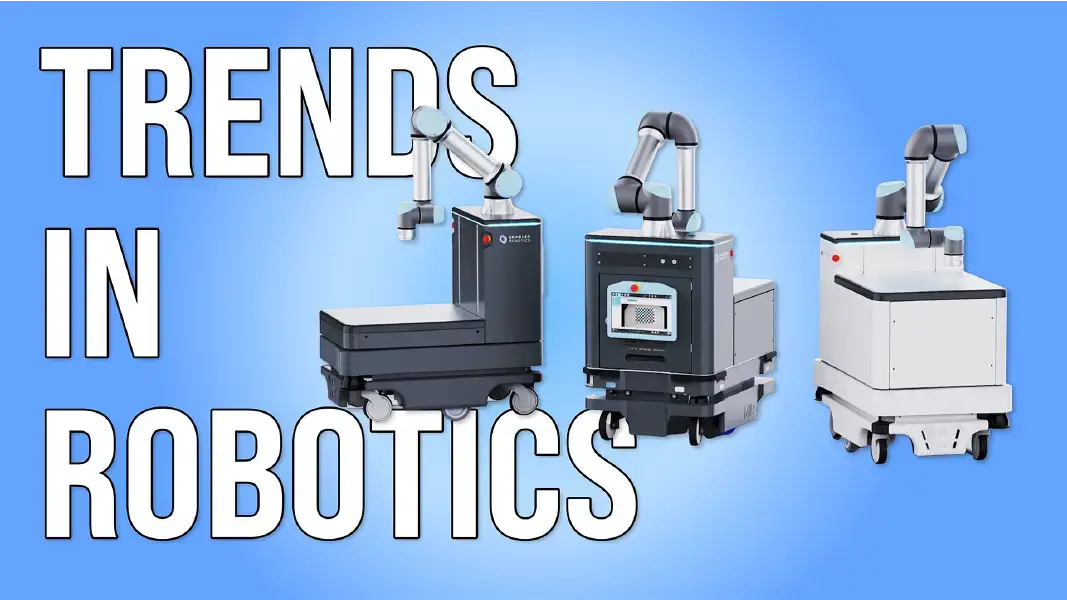
From collaborative robots to AI-driven systems, leaders like Kawasaki, Universal Robots, Balluff, Phoenix Contact, and MiR are setting new benchmarks for efficiency, safety, and flexibility. This blog post dives deeper into the key trends in the robotics industry, showcasing how these advancements are paving the way for the next generation of robotics and automation solutions.
Collaborative Robots (Cobots) Revolutionizing Workplaces
One of the most impactful trends in industrial automation is the rise of collaborative robots, commonly known as cobots. Unlike traditional robots, which often require safety barriers, cobots are designed to work safely alongside human operators in dynamic environments. Universal Robots (UR) has been at the forefront of this revolution, offering cobots that are transforming how businesses approach automation.
Cobots from UR are highly versatile, capable of handling repetitive and monotonous tasks like assembly, packaging, and inspection. By automating these processes, businesses can boost productivity while allowing their human workforce to focus on more complex problem-solving tasks. The best part? These cobots are easy to program and reconfigure, making automation accessible to companies of all sizes.

Smart Sensors and Advanced Connectivity
In the era of Industry 4.0, smart sensors and enhanced connectivity are becoming indispensable. Companies like Balluff are pioneering this space with their innovative industrial sensors that enable real-time data communication. These sensors collect critical information such as temperature and vibration, providing predictive maintenance insights that help prevent costly downtime.
For instance, Balluff’s condition monitoring sensors allow manufacturers to optimize their operations by identifying potential issues before they escalate. This proactive approach leads to significant improvements in efficiency and productivity, setting a new standard for smart manufacturing.

The Rise of the Industrial Internet of Things (IIoT)
The Industrial Internet of Things (IIoT) is a game-changer for the automation industry. By connecting robotic systems to cloud platforms and higher-level systems, companies can leverage real-time monitoring and data-driven decision-making. Phoenix Contact is leading the charge in this domain with its robust industrial communication solutions.
With IIoT-enabled infrastructure, manufacturers can seamlessly connect their machines, optimize production lines, manage energy consumption, and even implement predictive maintenance strategies. This connectivity not only improves operational efficiency but also supports sustainable manufacturing practices.

Autonomous Mobile Robots (AMRs) for Dynamic Environments
Another exciting development in the world of robotics is the emergence of Autonomous Mobile Robots (AMRs). Unlike traditional Automated Guided Vehicles (AGVs) that rely on fixed routes, AMRs like those developed by MiR (Mobile Industrial Robots) are equipped with onboard sensors and sophisticated mapping software. This enables them to autonomously navigate dynamic environments, making them ideal for material handling in factories.
MiR’s AMRs are transforming internal logistics by autonomously transporting materials between stations, reducing human intervention, and increasing efficiency. These robots can safely navigate around people and obstacles, minimizing downtime and optimizing supply chain operations.

AI and Machine Learning: The Future of Robotics
As we look to the future, AI and machine learning are set to play a pivotal role in advancing robotics. Kawasaki and other industry leaders are developing AI-driven systems that enhance robot performance and responsiveness. These intelligent systems enable real-time decision-making, optimize control, and reduce delays, resulting in faster cycle times, greater precision, and fewer errors.
AI-powered robotics are making machines smarter and more agile, paving the way for the next generation of automation solutions. This technology is not only enhancing production capabilities but also opening new possibilities for innovation in various industrial sectors.
The Road Ahead for Industrial Automation
With collaborative robots, smart sensors, IIoT, AMRs, and AI-driven robotics leading the way, the future of industrial automation is brighter than ever. These advancements are not just about increasing efficiency—they're about creating safer, smarter, and more adaptable manufacturing environments.
Ready to take the next step in your automation journey? Reach out to NEFF for expert guidance on your next project.
Watch the full video below to get an in-depth look at these trends.

